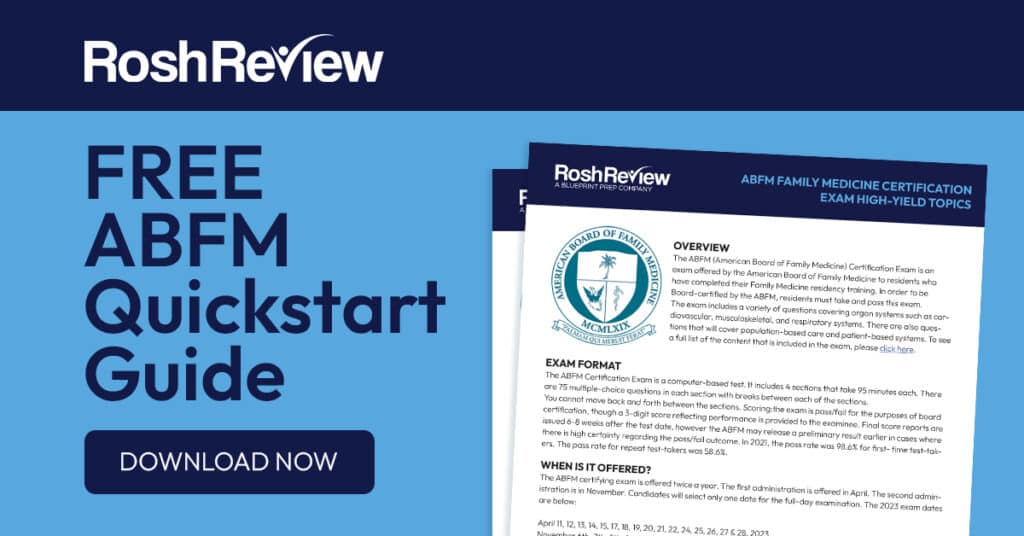Top Family Medicine Board FAQs: Everything You Need to Know Before ABFM Certification

The American Board of Family Medicine (ABFM) certification exam is a rigorous assessment that plays a pivotal role in certifying physicians in the field of family medicine. This comprehensive examination evaluates the knowledge, skills, and competence of aspiring family medicine practitioners, ensuring they meet the required standards set by the ABFM. The exam is designed to cover various content areas, from ambulatory medicine and emergency care to management of chronic illness and preventive care.
While specific details such as passing scores and exam format vary year to year, the ABFM board exam remains a significant milestone for physicians seeking initial board certification in family medicine. In this post, we’ll answer some frequently asked questions about it, including who is eligible to take it, what the format of the exam is, and what counts as a passing score.
Some Commonly Asked Questions About the ABFM Board Exam
Q: Who is eligible to take the ABFM exam?
A: Candidates are able to register and take the exam once they have successfully completed (or are nearing completion of) an ACGME-accredited family medicine residency and are board eligible.
The ABFM board eligibility policy defines “board eligible” as having completed residency training but not yet attained initial certification.
From the ABFM website:
“The seven-year board eligibility period begins the day after the successful completion of an ACGME-accredited family medicine residency training program. Your board eligibility period expires on December 31 of the seventh calendar year after the training completion date.
To obtain and maintain board eligible status, you must be engaged in an initial certification process and continuously adhere to the ABFM Guidelines for Professionalism, Licensure, and Personal Conduct.
If your seven-year period of board eligibility has expired, you must complete one year of additional training in an ACGME-accredited family medicine residency training program (or an ABFM-approved alternative) to gain an additional board eligibility period and to qualify for board certification. Outside of this seven-year window, it is not permissible for you to refer to yourself as board eligible.”
You can begin the process to obtain your certification by logging into your MyABFM Portfolio to verify that you have started the resident certification entry process or certification entry process. If you completed residency training more than three years ago, you will be required to start the certification entry process.
Q: What is the format of the ABFM Family Medicine board exam?
A: The ABFM exam has a multiple-choice question format, and there is a single best answer to each question. The exam consists of several sections, each containing a set of questions related to various topics within the field of family medicine, with a pooled break time. Questions consist of either a single-sentence question stem or a short clinical vignette, followed by 4 or 5 answer choices.
The ABFM website provides an exam blueprint that contains a list of five domains of care from which questions will be drawn, as well as a description of each of these content areas and the targeted percentage of questions in each domain. These content areas include:
- Acute Care and Diagnosis (35%)
- Chronic Care Management (25%)
- Emergent and Urgent Care (20%)
- Preventive Care (15%)
- Foundations of Care (5%)
Please be sure to check the ABFM website to get the most accurate and up-to-date information about the format and content.
Q: How long is the ABFM board certification exam?
A: The Family Medicine Certification Examination is a one-day exam divided into four sections of 75 multiple-choice questions. You will have 95 minutes to complete each section, with 100 minutes of total break time you can allot to take between sections.
The exam is a computer-based test proctored by Prometric testing centers, which allows you to mark questions for further review and highlight question content as you take the exam.
From the ABFM website:
A listing of completed questions, incomplete questions, and marked items may be accessed at any time during the examination for the currently active section. The examination screen contains a timer at the top center of the screen showing the time remaining for the current section. Candidates may click to view total remaining exam time as well. Items must be reviewed or changed prior to expiration of time for that section. Once a section is ended by the candidate or the section has timed out, candidates cannot return to questions in that section.
Q: What is the pass rate for the ABFM exam?
A: The pass rate in 2023 for physicians who completed residency in the U.S. was 93%, while for international graduates, it was around 88%. You can find more data about the ABFM pass rate here.
Q: What is the passing score for the ABFM Family Medicine Board Exam?
A: According to the 2023 score report, the ABFM board exam passing score is 380. In the report, you can see how many people pass, the region and education of those test takers, etc. From the bottom footnote, you can see that the minimum passing standard is 380. This has been the minimum passing score since 2020-2023, though that may change in the future.
The ABFM sets the passing standard by conducting rigorous statistical analyses and expert judgments to determine the minimum level of knowledge and competence required to pass the exam.
Q: When can I take the ABFM exam?
A: The ABFM exam is administered twice a year, typically over several weeks in the fall and spring. The exam may be taken upon completion of a family medicine residency, or within the last few months of a family medicine residency for residents who are in good standing. The exam should be taken within 3 years of completing residency to avoid additional requirements.
Most graduating physicians typically sit for the exam in April/May of their PGY-3 year, prior to graduation. Most fellowships require it, but not all—some will allow you to take it during fellowship. Keep in mind that the ABFM exam encompasses the entirety of family medicine, while fellowship training will be narrower in scope. I recommend taking the exam sooner rather than later in order to preserve your knowledge and do well on the exam.
Exact dates and registration details can be found on the ABFM website.
Q: Can I use reference materials during the ABFM board exam?
A: No, reference materials or electronic devices are not permitted during the exam. Candidates are expected to rely solely on their knowledge and understanding of the subject matter.
It’s important to note that specific policies and procedures may change over time, so it’s advisable to refer to the official ABFM website or contact the ABFM directly for the most accurate and up-to-date information about the exam.
Q: What happens if I don’t pass the ABFM Board Exam?
A: If you don’t pass the exam, you will have the opportunity to retake it. The ABFM provides feedback on areas of weakness to help you focus your study efforts for subsequent attempts. Remember, that you will have to pay the hefty registration and exam fees for each retake, as well as deal with the stress of exam prep, so it’s best to pass it the first time around.
Q: How should I prepare for the ABFM Board Exam?
A: As with most of the important exams you’ve taken to get to this point, from your SATs to your MCATs to your USMLE Step exams, there is not a silver bullet cure-all.
Effective preparation for the ABFM board exam typically involves a combination of ABFM review resources, including textbooks, review courses, question banks, and mock exams. Check out this “How to Select the Best Family Medicine Board Review” post for assistance choosing your ABFM review materials.
Additionally, many candidates find it helpful to create a study schedule and allocate dedicated time for each content area. Check out this video from Dr. Adam Rosh on how to effectively prepare for high-stakes exams:
Q: How long is ABFM board certification valid?
A: If certified prior to 2025, ABFM certification is valid for 10 years. After this period, physicians are required to go through the recertification process to maintain their certification status, though now ABFM offers CME credits and yearly recertification, along with other continuing certification activities.
Certification 2025
Effective January 1, 2025, the ABFM will be using a continuous 5-year recertification process called Certification 2025. The new process is built on the same foundational components as the current certification process. The new 5-year cycle offers the option of quarterly Longitudinal Assessment (FMCLA) (preferred), or 5-year recertification. It provides increased flexibility and convenience in candidates’ certification (e.g., 5 years versus 3 years for completion of certification activity requirements, 5th year off for diplomates who complete all requirements in 4 years).
Diplomates will not be required to transition to the new 5-year cycle any earlier than 10 years from when they last met their exam requirement. For example, ABFM diplomates who met their exam requirement in 2022 would not be required to begin their next exam any earlier than January 1, 2032. Finally, there will be no changes to ABFM fees in 2025.
Q: How soon will I get my ABFM exam results?
A: You will typically receive your preliminary results 3-7 business days following completion of the examination. A preliminary pass (or fail) is given to candidates whose exam attempt is clearly above (or below) the minimum passing score. However, a pending result is given when the exam attempt is close to it. Final and official examination results are typically received 6-8 weeks after the test date.
Q: Do I need the exam for fellowship?
A; This is a great question and tough to answer. The requirement for the ABFM board exam varies depending on the specific fellowship program. While completion of an ABFM residency program is a common prerequisite for fellowships in family medicine, the need for ABFM board certification may differ.
In some cases, fellowship programs may require applicants to have completed their ABFM certification exam and be board-certified or board eligible in family medicine. This requirement ensures that candidates have obtained a comprehensive understanding of core family medicine principles before pursuing specialized training.
However, there are also fellowship programs that do not explicitly require ABFM certification. These programs may consider applicants who have completed other residency programs, possess relevant experience, or demonstrate expertise in a particular subspecialty within family medicine.
It’s essential to review the specific requirements of the fellowship program you are interested in to determine whether ABFM board certification is necessary. The program’s website or contacting the program directly will provide you with the most accurate and up-to-date information regarding their prerequisites.
Keep in mind that the ABFM exam encompasses the entirety of family medicine, while fellowship training will be narrower in scope. I recommend taking the exam sooner rather than later in order to preserve your knowledge and do well on the test.
Q: What else should I know before I take the ABFM board exam?
Looking for more information about ABFM boards? Download the FREE ABFM Quickstart Guide to learn all about the exam format, topics, and more!

Rosh Review is a board review company providing Qbanks that boost your confidence for your boards and beyond. Get started with a Rosh Review free trial to the Qbank of your choice (no credit card required!) and gain access to board-style practice questions, detailed explanations, beautiful medical images, and more.
Get Free Access and Join Thousands of Happy Learners
You must be logged in to post a comment.





Comments (0)